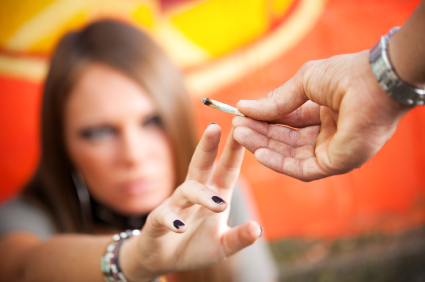 With the media full of horror stories and sensationalist reporting, it’s easy for any dad to fly into a panic when contemplating the idea of drug taking and their kids. However, the truth is that many teenagers may at least dabble with drugs, and that, of these, the vast majority will come out the other side unharmed. If you discover your teenager is one of these, the degree to which you manage to handle it calmly will help ensure a positive long-term outcome.
With the media full of horror stories and sensationalist reporting, it’s easy for any dad to fly into a panic when contemplating the idea of drug taking and their kids. However, the truth is that many teenagers may at least dabble with drugs, and that, of these, the vast majority will come out the other side unharmed. If you discover your teenager is one of these, the degree to which you manage to handle it calmly will help ensure a positive long-term outcome.
Types of drugs
There are literally hundreds of drugs out there to which your teenager may well be exposed, but amongst the commonest are:
- Marijuana (Grass, Weed, Ganja, Blow, Cannabis, Gear, Pot, Puff and a million other names)
- Ecstasy (Brownies, E, Eckies, Elephants M and M’s, MDMA, X, XTC)
- Amphetamine (Speed, Paste, Phet, Percy, Sulph, Whizz, Uppers)
- Cocaine (Charlie, Coke, Dust, Toot, Snow)
- Heroin (H, Gear, Horse, Skag, Smack)
- LSD (Acid, Hawk, Lucy, Rainbows, Sugar, Tab)
- Solvents (Gases, Glues, Aerosols)
Warning Signs
Many of the recognisable signs of using drugs are also recognisable signs of being a teenager – so be careful before flinging accusations about. Many of these signs can be taken to mean that something is troubling your teenager, and that something may well be linked to, or indeed be causing, the use of illegal drugs:
- losing interest in hobbies, sports, favourite activities
- making a new group of friends or losing touch with their old friends
- excessive tiredness/lack of appetite
- disrupted sleeping patterns
- dropping off of school work/attendance
- red eyes/runny nose/bad skin
- lack or personal hygiene
- involvement in criminal activity
Things that you may find around the house that could indicate drug use include:
- pipes
- rolling papers
- small medicine bottles
- eye drops
- butane lighters
- home made ‘bongs’ (pipes that use water as a filter) made from tin cans or plastic beverage bottles
- scorched tinfoil
- razor blades
- syringes
How to react
Keep the problem in perspective – many teenagers experiment with drugs and most are unharmed.
Knowledge is power – read up on drugs so you know exactly what you’re dealing with (See links below)
Stay calm, remain non-judgemental, resist the urge to lecture about the dangers of drug taking.
Don’t push your child into confessing, when they want to talk, they’ll talk – the fact that you stayed calm means they’re more likely to come to you
Don’t rely on your own experiences – maybe you never took drugs and so are extremely shocked, or maybe you took drugs when younger and so think you know a thing or two. Both attitudes would be wrong. The real world and the world of drugs are very different places to those in which you grew up.
Don’t attempt to talk when you suspect they’re high or stoned.
Make sure they know where to go for information and help.
It probably helps to have had some discussion of drugs when they were younger: i.e. before they started secondary school
Try to remain positive – this may sound difficult, but if you set about convincing your teenager that they’re throwing their lives away you may be contributing to the panic, stress and lack of self worth that led them to drug use in the first place.
Seeking help
The first port of call is probably your local GP or practice. You can talk to them in confidence, they will have dealt with such problems many times before, and they can advise you on the local support and treatment facilities.You could also contact:
- coluntary counselling/community centres
- teachers/school nurses
- youth workers
- social workers
- drug and alcohol agencies
Your teenager may wish to contact these bodies on their own behalf. Sometimes they’ll find it easier to discuss their problems with strangers. Try not to feel hurt by this – it’s often a measure of how much they care for your good opinion and don’t wish to feel they’ve let you down.
Author
Steve Cochrane is a freelance journalist and scriptwriter who is married with three children, varying in age from 17 to eight. As well as writing he has worked as a full time househusband, unofficial family childminder and has spent many years trying to come up with a better word for househusband.








